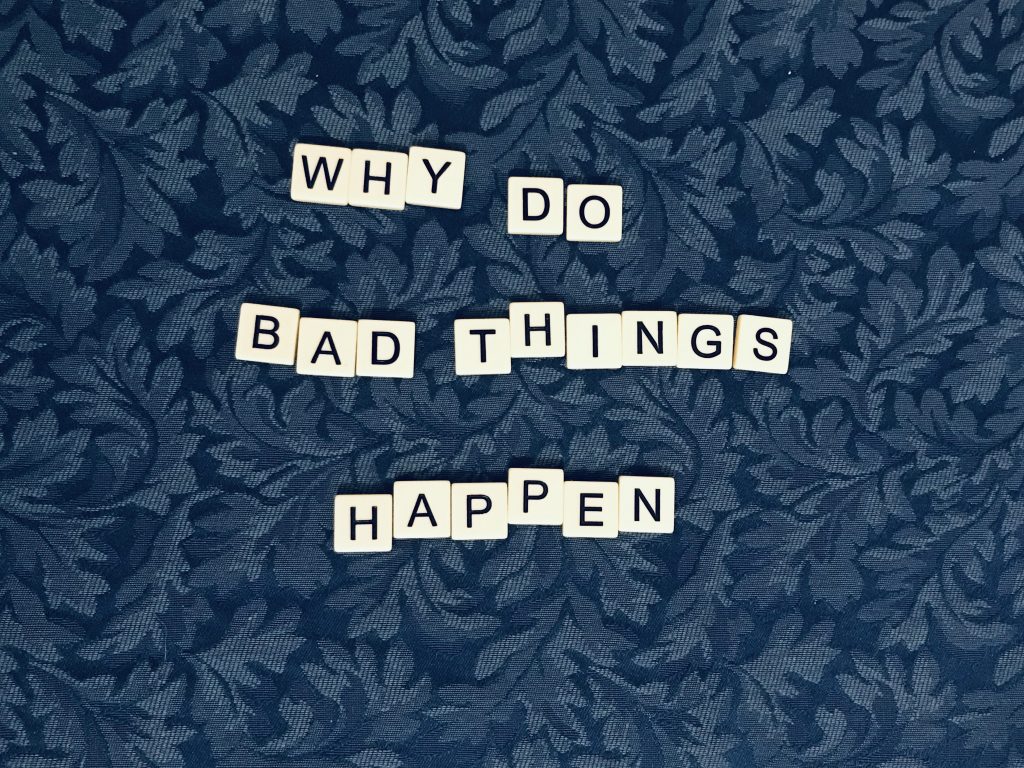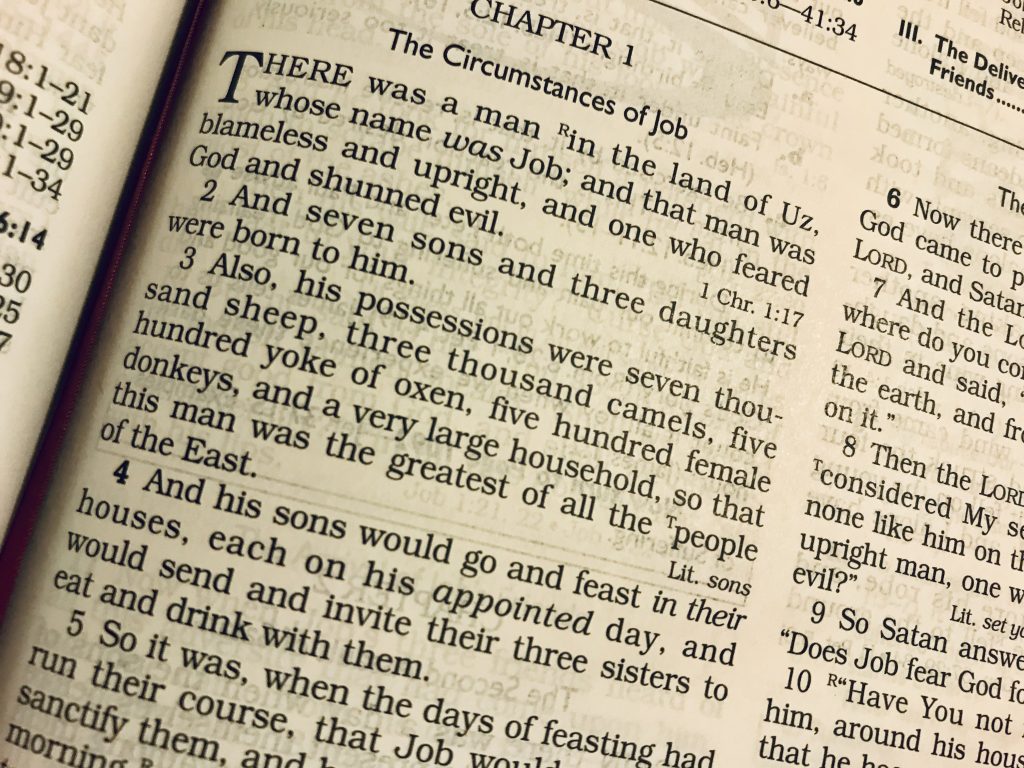Why do bad things happen to good people?
I’ve never liked that question, but it is important. It makes sense that we ask it. When bad things happen to good people, it feels unjust. God is just. (Job 4:17) He loves justice. (Psalm 11:7, 33:5, 99:4) We are made in His image. (Genesis 1:27) Injustice hurts our hearts because our hearts are fashioned after God’s heart. But I digress from why I sat down to write tonight.

This week a close friend of mine experienced monumental loss and grief. The details are hers and not fodder for my writing here, but my heart is shattered for her as she walks this path. She knows and trusts God, and I have faith that one day he will turn her ashes into joy. I sat down tonight to write because part of me feels useless, unable to comfort her.
Her loss points me to the only place I know to go when the pain is raw and real: God. Now I am not trying to give you a “Sunday School” answer, although, ironically, I will. Growing up, one of my close friends had his Sunday school answers ready: God, Jesus, and Moses. His canned response always brought a chuckle from the rest of our close-knit group and were occasionally correct. That’s not the type of answer I’m supplying.
The Best Bad Thing
My husband is my Sunday School/Life Group “teacher” now. Technically I teach with him when I’m not filling in somewhere else or chasing one of our kids. I consider myself mostly his responder-in-chief. Several months ago, maybe even years, he asked the class what was the worst sin that could happen? I felt like he teed this one up for me, a prosecutor and Sunday school attender since childhood: the murder of a truly innocent person. Next, he asked what was the best thing that could ever happen to humanity? The death and resurrection of Jesus Christ.
Let that sink in.
I was in awe of this connection I had never before seen. The worst possible bad was the best possible good. The murder of an innocent. Salvation available to all. Only God can do that.
Further, only God would use the most heart-wrenching pain for good. He freely gave His beloved child to save us. I thought I understood that I as child. I knew my parents loved me, but becoming a mother opened my eyes to the love of God. The loss of a child is generally held to be the highest grief – more than the loss of a parent, sibling or spouse. But God not only endured it, He chose it. No matter the pain in my heart, I can run to the One who not only understands my pain, but who chose to endure that pain for my good.
Bad things do happen to good people.
Sunday morning, I opened my Bible to Job 1. I did not turn there on purpose. In the process of reading through scripture, it was the next chapter in line. It did not feel like what I wanted to read, but God often chooses my needs over my feelings. Hesitantly, I began to read. Faithfully, God taught me as I read.

Verse one introduces us to Job — and what an introduction:
There was a man in the land of Uz whose name was Job, and that man was blameless and upright, one who feared God and turned away from evil.
Job 1:1
Bad things do happen to good people. Job was described as what we would all agree is a good person. Now, my Calvinist leanings here have to clarify: Job wasn’t sinless. Only Jesus was sinless. Some translations use the word perfect instead of blameless, but it essentially means “complete, entire, not wanting in any respect.” The point here is to make sure that we readers know that what is about to happen to Job is not retribution or consequence for something he has done.
We also see Job’s prospering family and his stewardship of the earthly goods God has given him. His children do not seem to have the godly character of their father, which is theologically rich in itself, but another blog for another day.
Job doesn’t get to know why.
Do you ever think about the first question you will ask God in heaven? Some want to understand how things work, but for most of us, it will be a “Why?”. Job had to have several primed when he arrived, and the top of his list is probably “Why did this happen?”
Job 1:8-12 gives us a peek into the “why,” but Job doesn’t get the same peek. No angelic messengers come let him in on the secret or even give him a warning of the hard, hard blows that are about to fall on him. He doesn’t get a special pep talk or extra helper. He does have three friends that will mostly stick with him through the coming calamity, but if you have read the book of Job, you may agree that they are not the most encouraging. Nope, Job is going about his normal everyday life when everything falls apart.
Job is given more than he can handle.
I’m not a fan of “churchy” phrases. “God will never give you more than you can handle” is probably near the top of that list. Job is probably the penultimate example to refute this phrase. Job 1:13-19 brings catastrophe after catastrophe. In a single day, two bands of raiders steal his oxen, donkeys, and camels and kill the servants with them; fire falls from heaven consuming his sheep and those servants, and all of his children are killed when the house they are in collapses from wind. Any one of these is shocking and devastating. The loss of his children comes as the final blow and one I am not sure I could survive.
The weight of the world is simply too much. It’s part of why we need God. If we never had more than we could handle, we’d handle it, right? Failed relationships. The death of loved ones. The stress of working and raising a family. The brokenness of our local and world politics. Temptations to gossip, hate, and lose your temper. It is truly too much.
We need God.
Grief and Worship
When my friend first sent me a message of the heavy news this week, in her same breath, she was pointing to and reaching for God. She knew that He could and would sustain her.

When calamity is all around Job, his instantaneous response is to worship:
Then Job arose and tore his robe and shaved his head and fell on the ground and worshiped.
Job 1:20
Notice that Job is both grieving and worshiping. The two are not mutually exclusive, rather hand in hand. His response caught me off guard. I didn’t remember this from reading through Job before — to worship through pain. As I pondered, I can remember more than one Sunday where I have sung with hands raised and tears flowing — a broken heart poured out to the Healer of broken hearts.
Scripture here does not shy away from Job’s grief, and God does not shy away from ours. Trusting Him does not mean that Christians auto-heal the moment we break. I love how John Piper addresses the normalcy of grieving:
Occasionally, weep deeply over the life that you hoped would be. Grieve the losses. Feel the pain. Then wash your face, trust God, and embrace the life that he’s given you.
-John Piper- https://www.desiringgod.org/embrace-the-life-god-has-given-you
Why?
Job didn’t get his why in the moment, or ever that we know of — and he had direct conversations with God. We may never know the why of our bad things. And do not read this to overlook that sometimes the bad things are consequences to our actions. But sometimes bad things do happen to good people. Grief is okay in God’s world, but it comes hand in hand with worship.
We learn a new worship song with our children every week, and several weeks ago, my oldest told me he did not feel like worshiping God. Oh his dear 4 year old heart. It was a good moment. I told him we don’t worship because we feel like it, because there will often be times that we do not. We worship because of who God is.
If you are hurting, grieving, and asking why — you do not walk alone. You walk in the footsteps of Christians before you, and I walk along side you. It’s okay to be not okay. Don’t let it pull your eyes from Christ. He’s the only Healer of Broken hearts.
Truthfully Yours,
DB
Further Resources: Take a Listen to John Piper on Glorifying God in Unshakable Grief
What a powerful explanation of how to grieve biblically. Wonderfully done!
So many helpful observations, Dani. Job is hard to swallow, but is SO instructional for us as believers.
The read-through plan that I do places Job at the end of the year for that reason, and I remember last year being struck at all the theological take-aways as I finished the year with it.
I think the question you pose is the one that a lot of non-believers want to hang their hat on, and the one upon which lots of believers stumble. I think our only recourse is to seek to know God better, and then to marvel at the faith he bestows upon us.
Thanks for the encouragement.
Wonderful devotion for the weird & trying times we are having in 2020!!
I love your blog❤️
I did not know you had this until your mom said something. So very sweet.
You are a true gift from above.
love,
nancy b.
There’s certainly a great deal to know about this topic.
I love all the points you made.